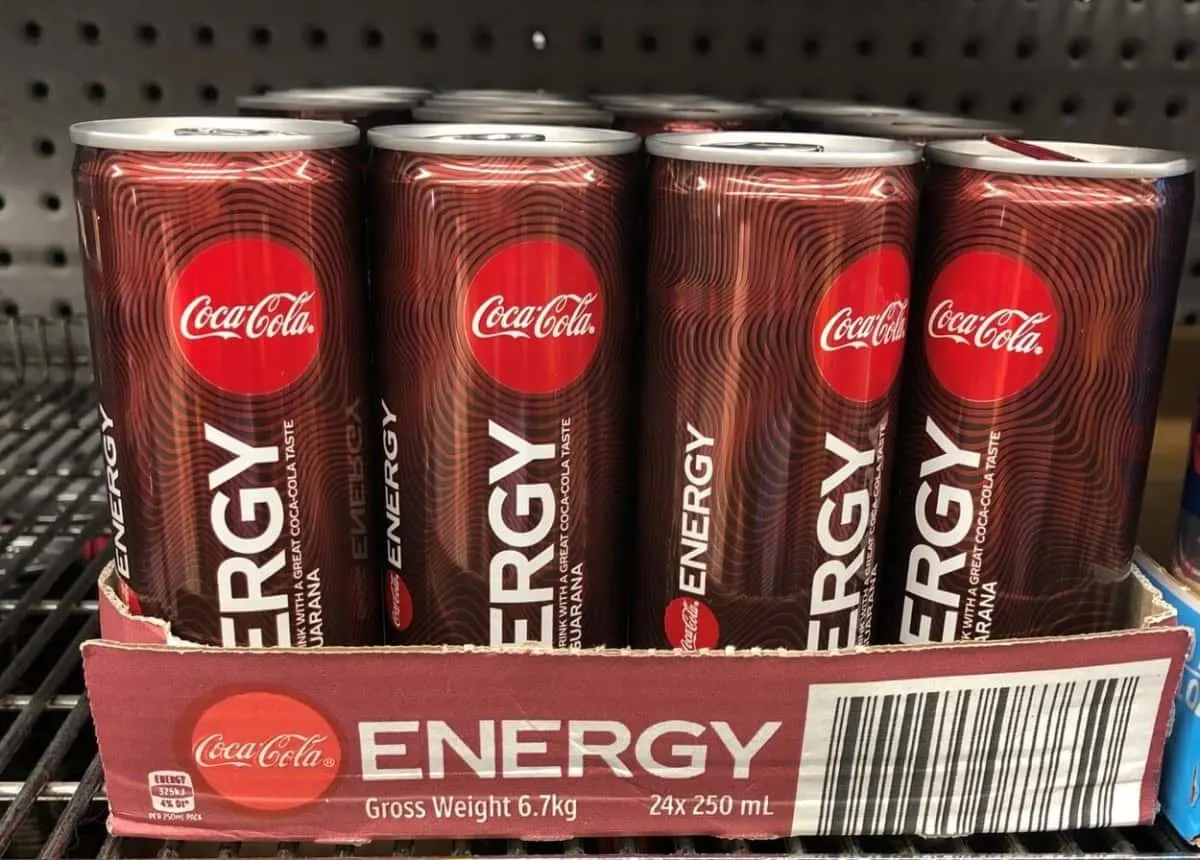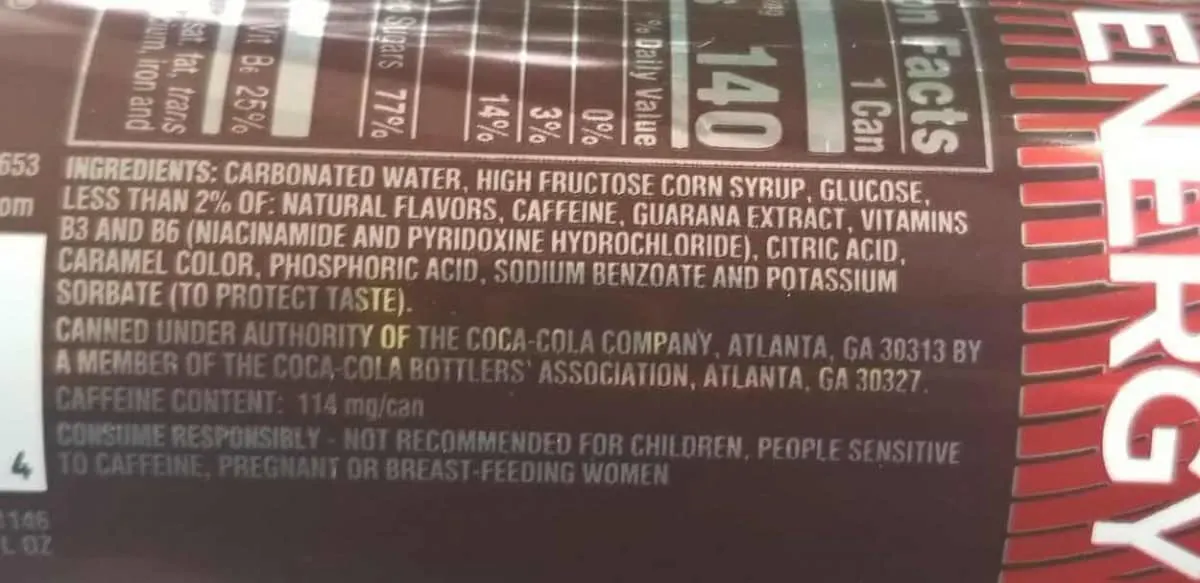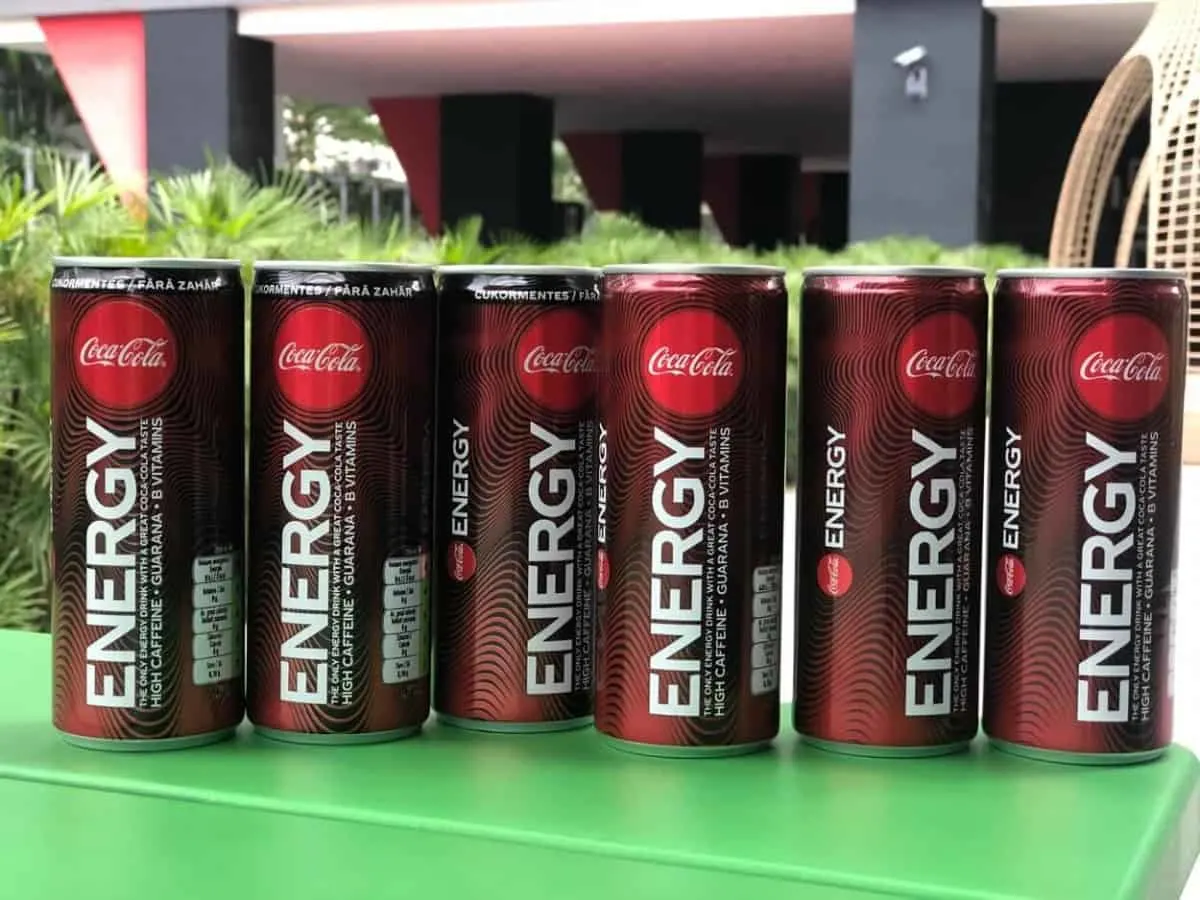
After producing many popular drinks like Coke or Diet Coke, Sprite, and Fanta, Coca-Cola launched their first Energy Drink. Well, that’s some great idea, incorporating everybody’s favorite soft drink into an energy drink.
A 12 fl. oz of Coca-Cola Energy is packed with caffeine and B-vitamins to boost up your energy when you’re tired.
So here in this article, let’s know each of the ingredient in the drink to speculate if it’s really bad for you.
Hint: Coca-Cola Energy Drink is not harmful for you if you limit your consumption of the drink.
Keep scrolling to know more…
Page Contents
Flavors Of Coca-Cola Energy Drink
There are only two flavors: Coke and Cherry. And these flavors also have sugar-free version:
- Coca-Cola Energy
- Coca-Cola Energy Zero Sugar
- Coca-Cola Energy Cherry
- Coca-Cola Energy Zero Sugar Cherry
Coca-Cola Energy Drink Price
Every 12fl. oz. costs more than $1, but it may vary due to shipping fees or different convenient stores. Although, the price is slightly similar to Monster (around $2) and RedBull (around $2).
So I’d say the price is average considering the other drinks which costs less, such as Venom (around $1).
What Are The Ingredients In Coca-Cola Energy Drink?
Drinking a 12fl. oz can of regular Coca-Cola Energy drink basically means having:
- Carbonated Water
- High Fructose Corn Syrup
- Glucose
- Natural Flavors (less than 2%)
- Caramel Color
- Caffeine
- Guarana
- Preservatives: Sodium Benzoate & Potassium Sorbate
- Vitamins B: Vitamin B3 (Niacinamide) & Vitamin B6
- Acidifier: Citric Acid and Phosphoric Acid

However, sugar-free Coca-Cola Energy drinks ingredients are slightly different:
- Carbonated Water
- Natural Flavors (less than 2%)
- Acesulfame Potassium
- Sucralose
- Caffeine
- Guarana Extracts
- Caramel Color
- Preservatives: Sodium Benzoate & Potassium Sorbate
- Vitamins B: Vitamin B3 (Niacinamide) & Vitamin B6
- Acidifier: Citric Acid and Phosphoric Acid
The difference between the two versions is the type of sugar used. Regular Coca-Cola Energy Drinks have High-Fructose Corn Syrup (HFCS) and Glucose. Whereas, Coca-Cola Energy Zero Sugar contains artificial sweeteners such as Sucralose and Acesulfame Potassium.
Coca-Cola Energy Drink Nutrition Facts
| Calories | 140 kCal |
| Caffeine | 114g |
| Total Fat | 0g |
| Sodium | 80mg |
| Potassium | 10mg |
| Total Carbohydrate (Added Sugar) | 39g |
| Protein | 0g |
| Niacin | 25% of Daily Value |
| Vit B6 | 25% of Daily Value |
Coca-Cola Energy Zero Sugar and Coca-Cola Energy Zero Sugar Cherry contents are almost the same except that they contain no-calorie or sugar.

How Many Calories Does Coca-Cola Energy Drink Have?
Calories are energy units that are required to carry the metabolism out of your body. Coca-Cola energy drink contains 140 calories. This is quite moderate compared to other energy drinks with higher calories, such as AMP or NOS.
On average, men need 2700 calories of calories per day and women need 2200 calories per day. Considering these amounts, Coca-Cola Energy Drink will take about 5% of your daily calorie limit.
If you’re on a diet and trying to cut down daily calorie intake, you shouldn’t drink more than one can. Or you could choose the zero-calorie version in case you want to enjoy the caffeine without extra energy.
How Much Caffeine Is There In Coca-Cola Energy Drink?
Caffeine is one of the major ingredients in energy drinks that stimulate your brain to keep you awake and help you think better. The Coca-Cola Energy drinks contain 114g of caffeine per 12fl. oz.
FDA approves 400mg of caffeine per day in the case of adults. I can only suggest you take 1 can of energy drink per day.
Although there are a lot of health benefits to caffeine such as reducing the risks of stroke, type 2 diabetes, cancer, and improving brain functions. Hence, having an excessive amount of caffeine per day can cause many side effects such as:
- insomnia
- anxiety
- increased heart rate
- stomachache
- nausea
- headache
So along with enjoying the momentary energetic feeling, it’s wise for you to keep in mind the drink’s caffeine content.
Sugar Content Of Coca-Cola Energy Drink.
A regular can of Coca-Cola Energy Drink contains 39g of sugar. Actually, this is a vast amount of sugar for a drink that can be emptied in just a few minutes.
AHA suggests men to have about 36g of added sugar per day and women to have even lower, 25g of added sugar per day only.
Glucose is a simple sugar used in the drink is most preferred over other types of sugar by the body for energy. But too much sugar consumption is never good. It may lead to several health issues such as:
- Weight gain
- Risks for heart diseases
- Type 2 diabetes
- Fatty Liver
- Cancer
- Acne
- Depression
So considering Coca-Cola Energy Drink surpluses the recommended sugar intake per day, you shouldn’t drink more than one can.

Artificial Sweeteners In Coca-Cola Energy Drink.
Artificial sweeteners have lesser nutritional value. They do help you reduce weight but certain underlying adverse effects of these components require further discussions.
High-Fructose Corn Syrup, Sucralose and Acesulfame Potassium can be found in Coca-Cola Energy Drink.
High-Fructose Corn Syrup in Coca-Cola Energy Drink.
High-Fructose Corn Syrup (HFCS) is a sweetener derived from corn starch and is used in a regular Coca-Cola Energy Drink. It’s produced by catalyzing glucose to fructose, which makes the component sweet. So there is approximately 42% to 55% of fructose present in HFCS.
The amount of HFCS in Coca-Cola Energy Drink is unknown, but I listed possible health concerns related to excessive consumption of HCFS:
- Risks of fatty liver
- Obesity or weight gain
- Diabetes
- Inflammatory diseases like gout
- Insulin resistance
So a lot of fructose is difficult for your body to break down. It is wise to consider that while having more than one can a day.
Sucralose In Coca-Cola Energy Drink
Sucralose is a common sugar alternative used in zero-calorie drinks and is considered safe. It’s more demandable because it’s 400-700 sweeter than other kinds of unnatural sweeteners, with no bitter aftertaste.
Coca-Cola Energy Zero Sugar and Coca-Cola Energy Zero Sugar Cherry contain Sucralose but it’s not as concerning as the other ingredients.
Sucralose has no significant effect on blood or insulin levels. Even if there is no direct negative impact of sucrose on health, there are a few things to keep in mind:
- It gravely affects the beneficial gut bacteria, which makes you susceptible to various diseases.
- It tricks you into thinking that having 2-3 cans of the zero-sugar energy drink is fine but it’s unhealthy. And you could develop the risk of obesity or heart diseases.
Acesulfame Potassium in Coca-Cola Energy Drink
Acesulfame Potassium is 200 times sweeter than table sugar and can be found in Coca-Cola Energy Zero Sugar and Coca-Cola Energy Zero Sugar.
Although FDA has permitted its use as a sweetener and flavor enhancer. But some studies found certain health concerns such as appetite regulation, cancer, body weight, and blood sugar control.
Which is why, it’s better to not make this drink an everyday thing.
Is There Taurine In Coca-Cola Energy Drink?
Coca-Cola Energy Drink is one of the few drinks which has no Taurine.
Taurine is an essential amino acid that is responsible for many important brain and heart functions and supports nerve growth. It is put into energy drinks to give you athletic energy and stimulate your metabolism.
Maybe Coca-Cola Energy Drink wouldn’t provide you energy as much as other drinks that contain taurine. But you already attain taurine from other food sources like meat, fish, or some vegan items.
Guarana Extracts In Coca-Cola Energy Drink.
Energy drinks use Guarana as a source of caffeine to provide you with focus and mental energy. It also helps to reduce fatigue after a heavy workout.
50–75mg of guarana has been researched to the safe limit. But there’s no mention of the amount of Guarana present in Coca-Cola Energy Drink. Long-term consumption of guarana doses might cause:
- headache
- anxiety and agitation
- ringing in the ears
- stomach cramps, and
- irregular heartbeats.
Another reason why you should have this drink occasionally is that regular consumption of guarana may lead to caffeine withdrawal.
Is it safe to drink Coca-Cola Energy every day?
It is safe to drink Coca-Cola Energy every day. However, it is also highly not advisable due to the possibility of caffeine addiction. Not consuming Coca-Cola Energy is crucial in avoiding caffeine addiction from the drink, despite not having that much caffeine content.
Even if Coca-Cola energy does not include as much caffeine or sugar as some of the other energy drinks on the market, drinking too much of it can still be harmful to your health. This is especially true if you drink it on a regular basis.
How damaging are energy drinks?
Energy drinks can be damaging to health when consumed excessively. They often contain high levels of caffeine, sugar, and additives that can lead to issues like increased heart rate, elevated blood pressure, weight gain, and dental problems.
It’s important to practice moderation and consider healthier alternatives for sustained energy.
Are energy drinks bad for studying?
Energy drinks may not be ideal for studying due to potential negative effects. Excessive consumption or consuming them close to bedtime can disrupt sleep and impair cognitive performance. High sugar content can cause energy fluctuations and difficulty concentrating.
Opting for healthier alternatives and maintaining a balanced lifestyle, including proper sleep and nutrition, is recommended for optimal studying.
How long does Coca-Cola energy stay in your system?
How long does Coca-Cola energy stay in your system depends on your metabolism. However, it is safe to say that due to caffeine content, Coca-Cola energy is bound to stay at least 4 hours. This also comes from the fact that energy drink helps you stay up for a while.
However, due to the fact that it has a half-life, caffeine stands out from the other components on the list. Consuming a lot of water will not hasten the rate which caffeine is broken down and will not drain it out the system any faster than it already does.
Final Thoughts

Coca-Cola Energy Drink is not healthy in some aspects but it’s not the worst either.
I’d certainly have this drink in circumstances like hitting the gym or during a hike. It has great flavors, a good amount of caffeine, and no taurine.
But I wouldn’t have this drink every day due to the high sugar content or harmful effects of artificial sweeteners. And I’d definitely not have more than 1 can a day.
Coca-Cola Energy Drink Alternatives
There’s no Energy Drink shortage in the market. But what I love about Coca-Cola Energy Drink is – its Cola flavor. I find it rare and I’d suggest you taste it.
But at the end of the day, all that matters is how a drink satisfies our taste buds. There are two flavors, but if none of them is your preference, you could try:
- Venom Energy Drink
- NOS Energy Drink
- AMP Energy Drink
- Game Fuel Energy Drink
- Monster Energy Drink
- Red Bull Energy Drink
